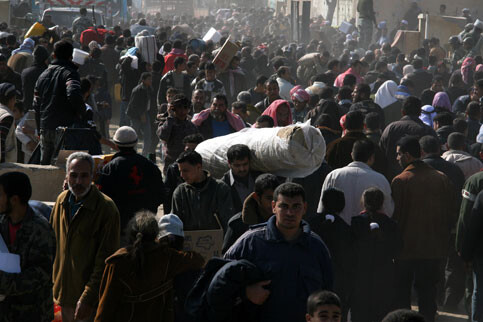Rafah, Gaza Strip 25 January 2008

Palestinians cross back from Egypt into Rafah in the southern Gaza Strip through the bombed metal fence, not seen, that used to separate the two sides of the border town, 24 January 2008. (Wissam Nassar/MaanImages)
Three kids, their mother and their aunt hurried towards the Salah al-Din gate in southern Gaza on Wednesday.
The mother, in her early thirties, explained in a rush, “We are heading to al-Arish [the Egypt border town] to follow my mom and brother who entered today after the borders were reopened.”
The family was not alone; thousands of other Palestinians thronged nearby, on their way to al-Arish, following the blasting through of the Israeli-built steel walls by Palestinian resistance fighters earlier that day. Hundreds of thousands of Palestinians poured from Gaza into Egypt’s Sinai peninsula, breathing a collective sigh of relief following a half-year of Israeli closure of all Gaza border crossings.
Those returning to Gaza carried everything from food to livestock. Other Gazans were carrying on their shoulders boxes of another precious commodity in besieged Gaza — cigarettes — the price of which has at least doubled over the past several months.
“We are bringing cigarettes because its cheaper in Egypt,” said one such individual.
The Rafah crossing terminal — the main point of entry into Gaza from Egypt — has been permanently closed since June 2007. On 19 September 2007 Israel declared Gaza an “enemy entity” and began imposing an additional series of collective punishment measures against the population, including sharp reductions of imports, ostensibly in reaction to the firing of homemade rockets from Gaza. However, Israeli public figures have repeatedly stated that the intent of the siege is to put pressure on the civilian population and erode popular support of the elected Hamas government which took control of the Strip this summer.
In a narrow muddy corridor near the fenced-off border, engineer and father of two Ramadan Said al-Na’ouq was heading towards the hole in the border wall in an attempt to get to Cairo to renew his Egyptian residency papers.
“I have been waiting for Israeli permission to travel to Cairo for the past three months; not only me, but 5,000 others are also waiting for the same,” said al-Na’ouq. “What can I say, it’s a golden opportunity for me to have my residence renewed. Otherwise, I will likely lose it in ten days. I only need a couple of days.”
However, it seemed Ramadan wouldn’t be able to fulfill his mission, as the Egyptian authorities closed all routes leading to Cairo, stating that they are only allowing “starving” Palestinians to acquire their needs from al-Arish and have blocked Palestinians from traveling further into Egypt.
With the borders sealed for the past several months, at least 1,500 Palestinians had been waiting on the Egyptian side unable to come home to Gaza, according to the Gaza-based Palestinian Centre for Human Rights. As the walls came down, many were able to cross.
Gaza’s crisis reached a breaking point after Israel declared late last week a total closure of all of Gaza’s crossings, including that of fuel, medicine and humanitarian assistance.
Because of the fuel cuts, Gaza has recently suffered an almost total blackout as the the Strip’s sole power plant was forced to shut down on Sunday.
Automobile traffic had been brought to a near standstill after petrol stations have run out of gasoline.
According to Mahmoud al-Khuzendar, deputy-chief of Gaza’s petrol stations society, the limited supplies Israel allowed in were “not enough to meet the essential [needs] of … the Palestinian people, because the supply of diesel is going to UNRWA [the UN agency for Palestinian refugees]. It’s not going for cars, for schools … for transport or all other aspects of life.”
Nineteen-year-old Mohammad Abu Kmail, just coming back from al-Arish, carried fuel, currently as precious as gold in Gaza following Israel’s cutting off of vital imports. “I was asked by my father, who works as a taxi driver in Gaza City, to bring some fuel so that he can earn a living,” Abu Kmail explained. “We are glad that the border is open, so we can at least bring things that are unavailable in Gaza, like fuel, which my father needs to feed us.”
In an interview with Reuters news agency, John Ging, head of UNRWA in Gaza, stated “ ‘Gaza cannot survive for very long at all without supplies and we are teetering here for the last seven months on the brink of a catastrophe … Israel is the occupying power. It has an international legal obligation to the civilian population here in Gaza as long as it is the occupying power.’”
On Wednesday, the UN launched an emergency appeal calling for $462 million to alleviate poverty in Gaza and the West Bank.
According to the UN, the poverty rate in the occupied West Bank and Gaza as a whole stands at 57 percent, the figure rising to 79 percent when Gaza is considered alone.
Since June 2007, 90 percent of Gaza’s local industries have been forced to shut down, leaving 70,000 laborers jobless, according to the Palestinian economy ministry’s figures.
Mahmoud Abu Marrasa is an unemployed father of five living in the Shati (Beach) refugee camp in western Gaza City. Abu Marrasa depends entirely on UNRWA’s rationed food assistance.
“Once this assistance is cut,” Abu Marrasa said, “my family and I will definitely be destroyed. I might commit a crime at any time in order to ensure there’s bread for my children. Today I am 100 percent [aid dependent].”
Rami Almeghari is currently contributor to several media outlets including the Palestine Chronicle, aljazeerah.info, IMEMC, The Electronic Intifada and Free Speech Radio News. Rami is also a former senior English translator at and editor in chief of the international press center of the Gaza-based Palestinian Information Service. He can be contacted at rami_almeghari at hotmail.com.
Related Links





